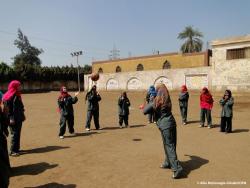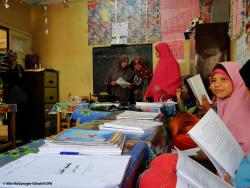
A life more enlightened: giving girls a second chance in Egypt
Media Contact
The lives of many adolescent girls living in Upper Egypt resemble those of young children in perpetuity, blindly obeying their parents– and then their husbands – with no control over their own destiny. Child marriage and a lack of education inevitably shape these girls’ futures, carving the direction their life paths will take. Nearly a quarter of girls aged 20-24 in this agricultural region have reported marrying before they turned 18. Most, if not all, first dropped out of school.
A confi
Across Egypt, while a promising 94% of girls are enrolled in primary school, only 64% attend secondary school. A 2006 survey found that about one out of every four girls aged 13-19 in rural Upper Egypt either received no schooling, or had dropped out after one or two years. Gameela was one of these girls, tired of being verbally and physically abused by teachers with whom she often quarreled. Remaining out of school for several years, she forgot everything she had learned and felt hopeless.
Then one day, Gameela’s life’s path was altered when two teachers from Save the Children’s Ishraq program stopped by her home and spoke to her parents
Launched in 2001, Ishraq, which means ‘enlightenment’ in Arabic, is a two year program for girls 12-15 who have dropped out of school. It aims to help them return to the classroom, teaching girls the literacy and numeracy skills needed to pass an exam required for re-enrollment. Critically, the program facilitators also teach them vital life skills, helping boost the girls’ self-confidence, their knowledge about sexual and reproductive health, and their future chances to earn an income. Two of the most important activities include financial literacy lessons and sports.
“Before Ishraq, no one cared about my condition, now Miss Shayma is looking out for me. I can tell her everything and I even bring my good grades from school to show her how I am succeeding,” Gameela said, referring to her former Ishraq teacher.
The goals of Ishraq are reflective of ICRW’s Turning Point Campaign. Launched in 2012, it focuses resources on research and programs that address the unique challenges adolescent girls face to leading healthy, productive lives as adults. Ultimately, the campaign aims to change the course for adolescent girls worldwide.

Today, ICRW researchers are taking a deeper look at Ishraq, along with two other programs, in South Asia and sub-Saharan Africa, in an attempt to further identify which specific components have contributed to their success. We also want to understand what role girls’ empowerment played in the process of achieving these outcomes. Our findings will be published next year, revealing what works in changing marriage-related attitudes, beliefs, and behaviors, and why.
As I interviewed Gameela and other Ishraq girls, the profound impact the program is having on their lives was obvious. They meet five days a week, gaining social and communication skills needed to succeed in the classroom and in the future, the workplace. Many of the girls said that before they didn’t know how to communicate and most of their interactions would end in arguments. They learn how to think critically, to form their own opinions, to act on their beliefs, and to value others’ opinions as well.
“I respect others and others respect me; in the past I was always arguing and shouting, now I can deal with anything, I can negotiate and get along well with others,” Gameela said.

Ishraq makes school an achievable reality. It completely changes the trajectory of their dreams – and their lives – as they now hope for a secondary school education, a good job, and an educated, caring groom. They have the assertiveness to stand up to belittling teachers, the confidence to persevere until they understand a new concept, the support from peers to handle difficult situations, and the motivation to stay committed to school despite the many obstacles they likely will face.
Gameela has graduated from the Ishraq program and is now enrolled in the formal school system. Before, she felt that she would have to accept any groom who proposed. Now, she will hold him to a higher standard. He must be educated, have a good job, and treat her well, she said, and above all else, she will not accept any proposal until she has finished her education.
To learn more about ICRW’s Turning Point Campaign and help change the course for adolescent girls worldwide, visit ICRW’s RaiseForWomen Challenge page.
*Gameela is not her real name.
A version of this article was published on Huffington Post Impact on June 03, 2013.
